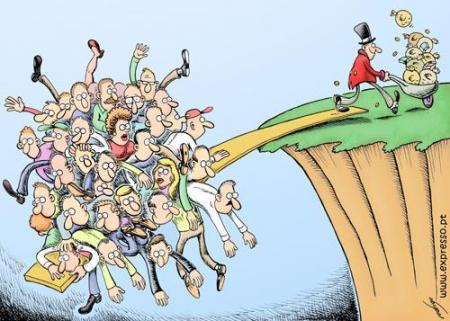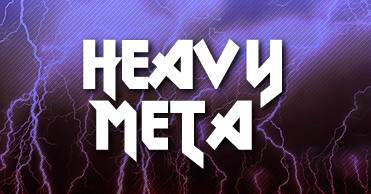As you might be able to tell from how late this post is going up, this is both a pretty complex topic, and one that I had to do a fair bit of thinking about how to address. A lot has been made of the “wisdom of crowds” and the power of social networking sites like Reddit to harness the power of the people to create a form of democracy more true to the etymology of the word, and less like the electoral system that so many have felt disenfranchised by over the years.
Our world (and in particular, our media) is so pessimistic that it’s refreshing to see people have this much faith in the new. But such optimism, much like anything, could stand to be tempered by reason lest it run away with itself. I was listening to the Nerdist podcast a while back when I heard Chris Hardwick describe Reddit as “the perfect meritocracy.”
*insert squealing brake sound here*
I immediately started mentally warning Mr. Hardwick to, as OOU’s own Martin is fond of saying, “slow his roll,” but despite my most formidable efforts, my psychic message failed to penetrate the abyss of the Internet and reach his overly enthusiastic eardrums.
The big problem I have with his enthusiasm comes from a seemingly innocuous equivocation of democracy with meritocracy. In essence, it implies that the option chosen by the unfettered will of the people will undoubtedly be the best option. The images that reach the front page of Imgur, for example, are by virtue of being there, the best images, because the most people voted for them.
I don’t know about you, but when reading that last sentence, I get a vaguely queasy feeling in my philosophical gut that tells me that not all is well. For that reason, on this week on Heavy Meta I’ll be testing two basic assumptions: First, the assumption that for the purposes of determining online visibility, unfettered democracy is the best option. Second, the assumption that social media systems like Reddit, Imgur, or Digg, represent the ideal meritocracy/democracy that e-vangelists like Hardwick seem to suggest they do.
The Front Page and the Illusion of Knowledge

Reddit markets itself as “the frontpage of the Internet”, where all the links that are fit to peruse gather. Those chosen stories that occupy the main pages of its various subreddits are voted on by literally millions of users, creating an environment where the vox populi have directly given their consent (via upvoting) that these are the stories most worthy of your time.
The problem is the hidden implication that, if these are the stories most worthy of your attention, them those further down must be less so, and so on/so forth. Popular posts are rewarded with visibility, and therefore the less visible a post is, typically the less popular it becomes. The conclusion this particular logic train rolls downhill towards is one that assumes “most popular = best”, which is far from always being the case. If it were, Transformers 4 would be the robot-vehicle hybrid spawn of Meryl Streep, sweeping up awards left and right.
Another implication of this assumption is even more dangerous. In believing that the most popular stories are the best ones, it cultivates the Illusion of Knowledge: the erroneous belief that once you’ve read the front page, you’ve seen all that’s worth seeing. The other hundreds of thousands of news items, editorials, or original content, might as well not even exist.
As any seasoned geek knows, the things that are most popular are often there because they either appeal to the lower common denominator, or are the least offensive. For instance: the world’s funniest joke, determined by similarly millions of votes in a multi-year study by Dr. Richard Wiseman of the British Association for the Advancement of Science, goes as follows:
A couple of New Jersey hunters are out in the woods when one of them falls to the ground. He doesn’t seem to be breathing and his eyes have rolled back in his head.
The other guy whips out his mobile phone and calls the emergency services. He gasps to the operator: “My friend is dead! What can I do?”
The operator, in a soothing voice, says: “Just take it easy. I can help. First, let’s make sure he’s dead.”
There is a silence, then a shot is heard. The guy’s voice comes back on the line. He says: “OK, now what?
Not exactly gut-busting, is it? Wiseman determined that the cause for the popularity of a joke was more influenced by the number of people it offended, rather than the degree to which people found it funny. The same jokes that sent people doubling over to the floor tended to be the same ones that wrinkled the noses of others, leading to humor ratings that balanced out around average.
Much like the jokes in the study, the viewpoints and opinions that garner the most approval are hardly ever the most moving or impassioned, but rather those that adhere to accepted dogma, and avoid offending most anyone. They’re safe, neutral, and avoid rocking the boat by avoiding taking any kind of a solid stance.
The inverse of this, as many seasoned movie geeks will attest, is that the most affecting and important views are often the hidden, unpopular gems. Many movies that we take to be legendary now were critically panned or controversial when they first debuted. Blade Runner, Pulp Fiction, and Shawshank Redemption all fall within these categories. It’s only decades later, when the bold choices made by directors have irreversibly changed the cinematic universe that we in retrospect recognize the genius of their methods.
The parallel is easily drawn with strong or controversial opinions on boards such as Reddit. Sure, there are the rare examples of campaigns that go viral, but for the most part, revolutions (in thought or otherwise) are slow in building. It’s true that the internet has played a significant part in allowing niche media to find an audience, but when it comes to movements like gender equality or net neutrality, appealing to a proportionally small sect of the population (even if that percentage is made up of millions of people) amounts to preaching to the choir in an echo chamber of political opinion. Without the visibility to a wider audience, lasting change isn’t given the opportunity to occur on a large scale.
It’s for this reason that the algorithms that determine visibility on Google, Tumblr, and Reddit (and the Eclipse by the Mediocre that they cause) are so harmful. The important stuff, the world-changing stuff, the truly human, is almost never the most popular.
Power To the Empowered

Another issue that throws a wrench in the idea that Reddit is a People’s Meritocracy is the fact that for a democracy to be effective, the voters must both be properly informed, and comprise a proportionally representative sample from all relevant demographics (age, race, economic status, etc).
One of many social sites’ strongest points; the ability to let users post pseudonymously, is also an obstacle to be dealt with in terms of representation. Reddit in particular is a text-based site, so when a post reaches the front page, one might be forgiven for assuming that those who endorsed come from a venerable Benaton ad worth of diverse backgrounds.
However, a report put out by Pew shows that the sect of the population that uses Reddit, for example, is heavily skewed towards 18-29 year old males. Furthermore, only 6% of the adult population in the U.S. uses it. To be sure, that is a massive number, but if one were to poll the entirety of the country for their opinions on a given subject, 6% falls woefully short of what would be required to get a clear picture.
An annoying quirk in human psychology tends to cause us to assume that the views held by those around us are representative of people as a whole. The same thing happens with online communities, and when information about who is endorsing and saying what isn’t available, it makes it that much easier to believe that every guy thinks women who become friends with them but then refuse sex are manipulative bitches, even though its just you and the other fedora wearing neckbeards incessantly scratching Cheeto-dust off their oversized black t-shirts who feel that way.
The Front Page Illusion I mentioned in the previous section makes this phenomenon worse, as the one post by a woman who endorses the “Friend Zone” woes is likely to attract upvotes from (mostly 18-29, male) users like light into a singularity, rocketing to the front page. Once there, those who view it are liable to take it as further confirmation of that the view of this one user is representative of women’s views as a whole. All this culminates in a dangerously cyclical version of confirmation bias, making it increasingly more difficult to debunk these or other harmful social views in the process.
Get Smart(er)

The next question then becomes: How do we address these problems? Those NSA members in my readership (hi guys!) would likely be the first to suggest that requiring real-life identification and info documentation is the way to go. However, despite my mentioning of the problems caused by internet pseudonyms sounding like endorsement for surveillance and transparency, it’s improbable that these measures would help any more than they help curb abusive behavior.
One need only look at political articles from news sites that show Facebook comment threads to see that using real-life identification, pictures, and even locations, fail to get people to alter their behavior significantly from their anonymous/pseudonymous peers. Even Reddit co-founder Alexis Ohanian has said on the Nerdist podcast that pseudonyms carry more benefits than drawbacks (at least on forums that are well moderated), by allowing people from marginalized communities to have honest and open discussions without fear of reprisal. Furthermore, Ohanian should be given brownie points for taking a proactive lead on modifying the algorithms underlying Reddit to prevent people from voting en masse to actively suppress or promote certain posts.
So clearly steps are being done on the other side of the screen to try and improve the situation, and some aspects of it like pseudonymity, require us to take the good with the bad. However, the fact remains that there are gaping holes in a network that so many people put such a great deal of faith in. The unpopular response to trying to fix those holes is this: We simply have to be smarter about it.
Michael Harris wrote in his book The End of Absence about the concern by many thinkers about the rise of shallow processing: the tendency of individuals to “know” facts, but to rarely do the deep thinking required to fully understand their logistical inner workings. People at large consider the Internet to be the repository of “where the information is.” You type a question into Google, you get an answer. Simple as that, right? Except that, as I’ve demonstrated in the earlier sections, the structure of various aspects on the Internet makes it so that numerous assumptions can be repeatedly endorsed without being actually backed up by factual proof.
It’s at times like these that I get to bandy about my philosophy education: we need to re-learn critical thinking skills. To take a skeptical eye towards what we see, hear, and read online. Especially given the deluge of information that we’re subjected to, the true wisdom comes in knowing precisely how to sift through and evaluate various points of view for their validity:
-What is the source this piece of information is coming from?
-Do we have reasonable cause to believe that a given source has a vested interest in pushing one side of the issue over another?
-Hm, that’s a well-argued, compelling series of points for that perspective. But I’d like to see what the other side has to say before drawing a conclusion.
-Do the premises and conclusion of this argument logically follow from one another?
-Is the author falling prey to any of these logical fallacies in an attempt to make their argument more compelling?
-What relevant pieces of information aren’t present here? Is there a reason for that? How can I get access to this information?
Winston Churchill once famously said that democracy is the worst political system, except for all the others. In a world where we’re inundated with feedback on the opinions of the crowd, we’ve reached a point where an increase in the amount of feedback has diminishing returns. In order to make better use of the powerful forums like those of Tumblr or Reddit, we can no longer rely on the efficiency of machines. By re-learning how to deconstruct, analyse, and communicate effectively, we can both broaden our horizons by taking in a wider berth of perspectives, and then use that newfound awareness to participate in discussions that can further the cause of making society the kind of place worthy of the idealism we place on it.
Vince Smith is a writer, podcast host, and dyed-in-the-wool lover of minutia. You can check out his other work over at www.roguescast.com , or drop by his Facebook Page for other musings from the catacombs of the Internet.
-Written by Vincent Mendoza
 If you have a few extra dimes to spare, please help us help a fan in need. Thank you!
If you have a few extra dimes to spare, please help us help a fan in need. Thank you!








